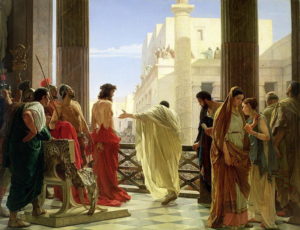Thoughts on Sunday’s Lessons for Nov. 25, 2018

Ecce Homo (Behold the Man), Christ before Pilate (c. 1860-c. 1880), oil painting by Antonio Ciseri (1821-1891). Museo Cantonale d’Arte, Lugano, Switzerland. (Click image to enlarge.)
First Reading (Track One): 2 Samuel 23:1-7
We conclude the long string of Sundays after Pentecost with the feast of Christ the King – sometimes called the less patriarchal “Reign of Christ” – with a poetic passage called “The Last Words of David.” This hymn of praise, likely written in David’s memory long after his death, declares David as God’s favorite, a just ruler, the one through whom the God of Israel speaks. God has made an everlasting covenant with David, one that will bring prosperity to his reign and success to all his descendants.
First Reading (Track Two): Daniel 7:9-10, 13-14
It might seem awkward for Americans, who tossed out the British king in 1776 in favor of a Republic governed by its people, to declare God a traditional monarch and Jesus a warrior king. But Christ as King or Lord stands in opposition to earthly kings. In contrast with the emperor of Rome, Christ was a new, different kind of king, bringing a new and just kind of kingdom where all receive their daily bread. Our first reading from Daniel imagines an Ancient One, a mighty God of flame, coming in clouds on a fiery throne, an all-powerful God giving dominion over all peoples, nations, and languages.
Psalm (Track One): Psalm 132:1-13 (14-19)
Sunday’s Psalm continues in the spirit of this week’s first reading about David and God’s covenant to bless and bring prosperity to him and to his descendants. Remembering the hardships that David endured in keeping his oath to God, the Psalmist vows not to rest until Israel builds a temple on Mount Zion, a dwelling place on earth where God can rest. If Israel’s children keep the covenant that their kingly ancestor made with God, then Israel will sit on David’s throne forever.
Psalm (Track Two): Psalm 93
God is king! God is majestic! God is powerful! How this mighty hymn must have thundered through the ancient temple, celebrating the power and the kingship of God in metaphors of sound and fury: Roaring floods and massive ocean waves thundering, calling out the glory of God our king. Unlike earthly kings, the Psalmist sings, God’s world is certain, immovable and mighty. God’s kingdom will endure, sure and holy, for ever and evermore.
Second Reading: Revelation 1:4b-8
This greeting from the first page of Revelation gives away the simple secret of this mysterious book: It is not a strange and frightening prediction of the End Times, nor does it conceal coded information about our times, or any other time or place. It was a subversive sermon for persecuted Christians in Asia Minor, carrying this simple message: God our King, who was with us at the beginning and will be with us at the end, loves us and frees us from our sins through Christ. In words that echo the Daniel reading, we hear that Jesus our Savior, God, ruler of all the kings of the earth, will come back with the clouds to deliver justice.
Gospel: John 18:33-37
Finally, in John’s Gospel, Jesus makes his kingship clear as he stands before Pilate. Or does he? Accused of declaring himself king of the Jews, an act of treason against the powerful Roman Empire, Jesus answers, clearly and firmly, “My kingdom is not of this world.” Pilate remains puzzled. Jesus stakes his claim to a kingdom and claims his kingship, but it’s “not from here,” adding that he came into the world to testify to the truth. Is he a king? “You say so,” Jesus replies to Pilate. But when and how will this kingdom come? Will it come in the future with trumpet blasts and fire and brimstone? Or do we build it every day when we act as Christ’s hands in the world?
What are “Track 1” and “Track 2”?
During the long green season after Pentecost, there are two tracks (or strands) each week for Old Testament readings. Within each track, there is a Psalm chosen to accompany the particular lesson.
The Revised Common Lectionary allows us to make use of either of these tracks, but once a track has been selected, it should be followed through to the end of the Pentecost season, rather than jumping back and forth between the two strands.
For more information from LectionaryPage.net, click here.
